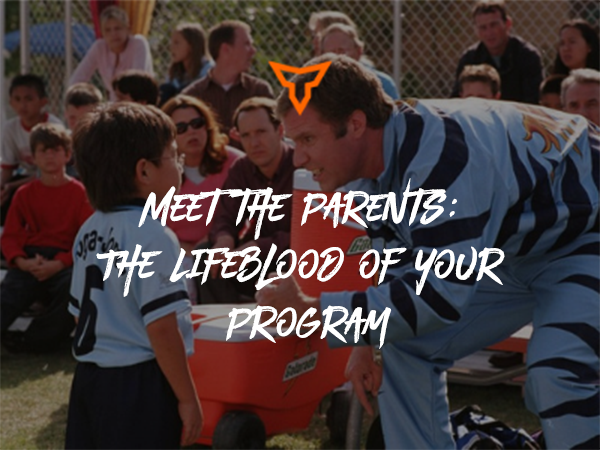Building trust with your athletes is key to developing “buy-in”. If your athletes cannot trust you as a person, then they will not trust you as a coach. As a coach, learning how to build trust with clients and players is sometimes counterintuitive. When it comes to trust, you need to plant seeds of servanthood, water those seeds with love, and then prune the relationship of all the junk that will try to kill the trust that was developed.
I am not just the S&C Coach at Independence High School in Northern Virginia, but I am also their FCA (Fellowship of Christian Athletes) Character Coach. FCA Character Coaches main focus is to impact athletes and coaches for Christ by serving their local teams and being a Godly influence. Every Character Coach looks different because FCA does not have a guidebook to show us how to be a successful Character Coach. We are basically told to develop relationships with the athletes and coaches and learn how to best serve their particular team. There is no right way or wrong way to do this as long as the Character Coach is meeting their needs to the best of their ability. One of the main ingredients to developing a strong and lasting relationship with the athletes and coaches is trust. Without trust, I cannot begin to make an impact on the athletes or coaches that I am trying to serve.
Trust grows from seeds of servanthood. However, if your primary focus and goal is developing trust, you will be planting bad seeds that will not produce a strong, healthy relationship. Let’s say that your main goal is to build trust with one of your new athletes and after 6 months of focused effort, the trust still isn’t there. Naturally, you will feel like a failure and will want to change your focus and efforts to another athlete. This not only hurts the athlete, but the culture that you are trying to build. Instead, I challenge you to make serving your daily focus and goal. We can all find ways to serve our teams and athletes on a daily basis. If every day, you found a way to serve your coaches, athletes, or teams then daily, you will have reached your goal. This not only increases your motivation, but when you consistently make sacrifices to serve others without an alternative motive, they take notice and it presents an opportunity for trust to be developed and matured. However, if you are focused on earning their trust instead of just serving them, you tend to create a transactional relationship. With so many superficial relationships, your athletes are looking for something different. Simply serve your athletes and they will trust you and seek to build a lasting relationship.
Once the seeds of servanthood are planted you will need to water them with love for trust to grow. People thoughtlessly throw the word love around, but many are not willing to sacrifice and put in the work that love requires. Love is a verb that is developed from the outside, in. What I mean by that is, as we consistently do acts of love, the emotions of love are established on the inside. The emotions follow the actions. Acts of love will require you to sacrifice your time, your finances, and your pride. You will have to take time out of your day to reach out to athletes and have conversations with them that extend outside of the weight room and their sport. There will be times when you will need to purchase items for athletes who are in need or just to bless them. Every day, you will have to be vulnerable, open and honest with your athletes to foster a strong relationship and sometimes this will require you to swallow your pride. Truly loving others is not always easy, but it is always worth it.
Finally, to be a servant leader we must learn to recognize the issues that are eating at our relationships and prune them. Sometimes those issues are from within ourselves and sometimes they are issues that are outside of our control. None of us are perfect and we all have areas of our lives that we need to work on. Don’t hide from your character flaws, seek out people you trust to point them out to you and then work on correcting them.
Relationships are messy and there will always be issues in relationships that are out of your control. Focusing on the things you can’t control will destroy the relationships and trust that you are trying to build. Instead of focusing on what you can’t control, focus on what you can control which is your side of the relationship. If you are focused on serving and loving your athletes, coaches, and teams then you won’t have time to give too much attention to those things outside of your control.
Ultimately, it takes a servant leader to create an environment of trust for your athletes. As you commit each day to purposefully seeking opportunities to serve your athletes through acts of love, you will find that it is no longer something you do, it becomes who you are. Before you know it, athletes will start to be drawn to you and without trying, trust will be born and overtime matured as you consistently love and serve them. The byproduct of this type of relationship is a legacy of love and serventhood. Like a cup of water, as you pour into your athletes their “cup” will start to overflow and run over. That overflow will pour into the lives of those in their circle of influence. If you want a culture of love and servant leaders, than start serving your athletes and start pouring love into their lives and watch the culture change right before your eyes.
Martin Luther King Jr. said it best when he said, “Everybody can be great…..because anybody can serve. You don’t have to have a college degree to serve. You don’t have to make your subject and verb agree to serve. You only need a heart full of grace. A soul generated by love.”
Subscribe to our blog
Subscribe to receive the latest blog posts to your inbox every week.
Related posts

3 Tips for Developing Athlete Buy-In

Meet the Parents: The Lifeblood of Your Program
%201.png?width=720&height=400&name=Sport%20Coach%20(4)%201.png)